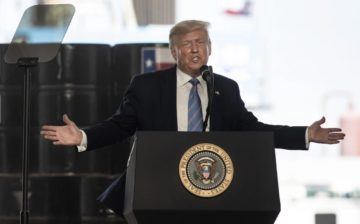Thomas Oatley and Mark Blyth in Foreign Policy:
 In 2020, President Donald Trump received more votes, almost 75 million, than any sitting president in U.S. history. And yet he lost the popular vote to Joe Biden, who received more votes than any presidential candidate in U.S. history—full stop. The 2020 election will thus go down in history as one in which Americans were both remarkably mobilized and sharply divided.
In 2020, President Donald Trump received more votes, almost 75 million, than any sitting president in U.S. history. And yet he lost the popular vote to Joe Biden, who received more votes than any presidential candidate in U.S. history—full stop. The 2020 election will thus go down in history as one in which Americans were both remarkably mobilized and sharply divided.
To date, the election postmortem focused on the role of the pandemic and its associated economic collapse, the long-standing divides uncovered by the Black Lives Matter protests, the appeal within a segment of the electorate of Trump’s personal brand, and an overestimate in the polls of Biden’s lead.
But such issues miss the forest by obsessing about some (important) trees. In particular, the discussion pays almost no attention to the more profound changes in the U.S. economy’s structure that have both produced Trump and will continue to make Trumpism part of the fabric of U.S. politics for years to come. It’s time to recognize that Trump is a symptom, not a cause, of our discomfort. And to understand that, we need to clear out the broader theoretical models that shape how we think about politics.
More here.
